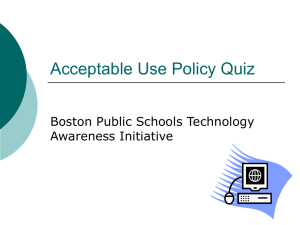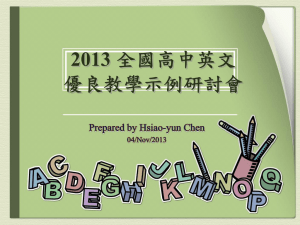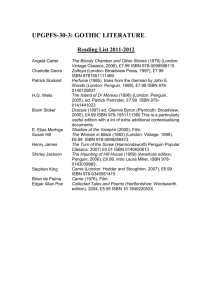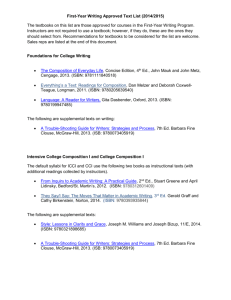KUTZTOWN UNIVERSITY KUTZTOWN, PENNSYLVANIA
advertisement
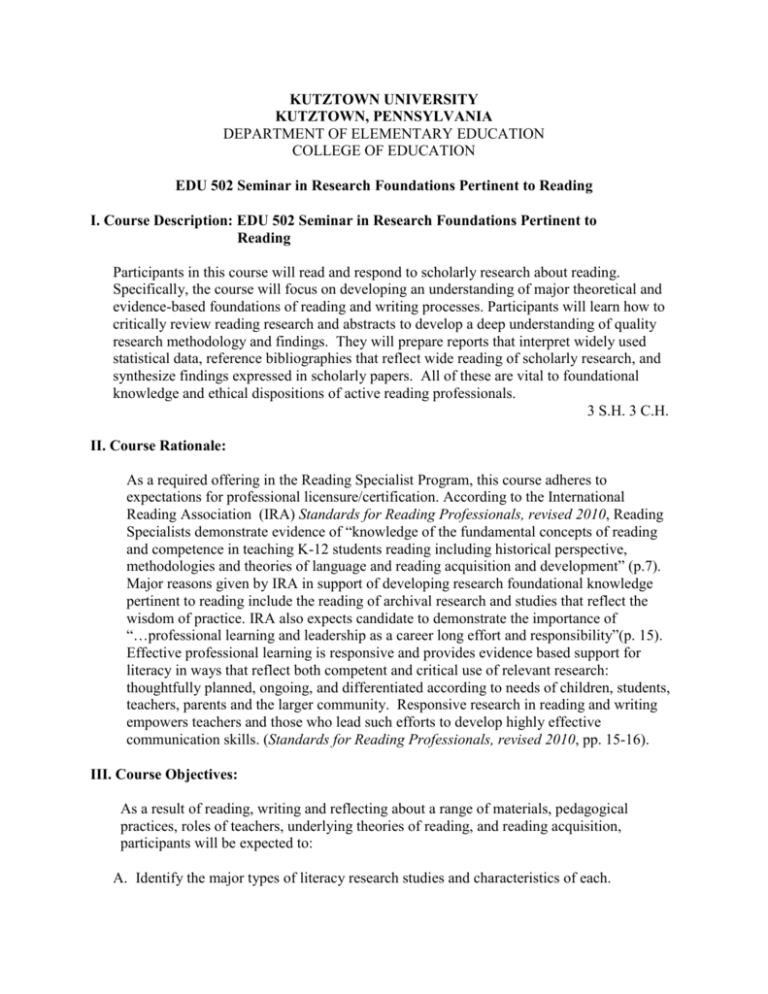
KUTZTOWN UNIVERSITY KUTZTOWN, PENNSYLVANIA DEPARTMENT OF ELEMENTARY EDUCATION COLLEGE OF EDUCATION EDU 502 Seminar in Research Foundations Pertinent to Reading I. Course Description: EDU 502 Seminar in Research Foundations Pertinent to Reading Participants in this course will read and respond to scholarly research about reading. Specifically, the course will focus on developing an understanding of major theoretical and evidence-based foundations of reading and writing processes. Participants will learn how to critically review reading research and abstracts to develop a deep understanding of quality research methodology and findings. They will prepare reports that interpret widely used statistical data, reference bibliographies that reflect wide reading of scholarly research, and synthesize findings expressed in scholarly papers. All of these are vital to foundational knowledge and ethical dispositions of active reading professionals. 3 S.H. 3 C.H. II. Course Rationale: As a required offering in the Reading Specialist Program, this course adheres to expectations for professional licensure/certification. According to the International Reading Association (IRA) Standards for Reading Professionals, revised 2010, Reading Specialists demonstrate evidence of “knowledge of the fundamental concepts of reading and competence in teaching K-12 students reading including historical perspective, methodologies and theories of language and reading acquisition and development” (p.7). Major reasons given by IRA in support of developing research foundational knowledge pertinent to reading include the reading of archival research and studies that reflect the wisdom of practice. IRA also expects candidate to demonstrate the importance of “…professional learning and leadership as a career long effort and responsibility”(p. 15). Effective professional learning is responsive and provides evidence based support for literacy in ways that reflect both competent and critical use of relevant research: thoughtfully planned, ongoing, and differentiated according to needs of children, students, teachers, parents and the larger community. Responsive research in reading and writing empowers teachers and those who lead such efforts to develop highly effective communication skills. (Standards for Reading Professionals, revised 2010, pp. 15-16). III. Course Objectives: As a result of reading, writing and reflecting about a range of materials, pedagogical practices, roles of teachers, underlying theories of reading, and reading acquisition, participants will be expected to: A. Identify the major types of literacy research studies and characteristics of each. B. Know and be able to use the sources and tools for locating research reports related to a particular topic or problem. C. List and explain the component parts of a research study pertinent to reading and writing. D. Read and understand the literature and research about factors that contribute to reading success (e.g. social, cognitive, and physical). E. Interpret and summarize historically shared knowledge (e.g. instructional strategies and theories) that addresses the needs of each and every reader. F. Interpret major theories of reading and writing processes and development to understand the needs of each and every reader in diverse contexts. G. Articulate the research base related to the connections among teacher dispositions, student learning, and the involvement of parents, guardians, and the community. H. Inform educators and others about the historically shared knowledge base in reading and writing and its role in reading education. I. Apply the findings of research to curriculum construction and incorporate the findings into instructional techniques that demonstrate professional learning and leadership. J. Interpret numerous research studies and widely used statistical terminologies and techniques that demonstrate a critical stance toward the scholarship of reading. K. Use with ease and proficiency the APA guidelines for the preparation of a technical report. IV. Assessment: Assessments based on a subset of the following: Instructional portfolio, abstract reports, papers, projects, quizzes, exams, presentations. V. Course outline: I. Research design A. Kinds of research 1. Case study 2. Action 3. Descriptive 4. Experimental 5. Historical B. Characteristics of each C. Advantages and disadvantages of each II. Seminal research (historical knowledge) related to reading and writing III. Research related to dispositions A. Professional learning and leadership implications B. Preparation of dispositions paper IV. Component elements of a [traditional] research paper A. Introduction … The problem (Why?) 1. Background of the study 2. Need and importance of the study 3. Statement of the problem 4. Focusing questions 5. Variables associated with the problem B. Limitations/delimitations/parameters (boundaries) 1. Distinguishing features of the paper 2. Definition of unusual terms 3. Population involved 4. The sample population and its selection 5. Random, nonrandom and biased samples 6. Materials, including those specifically designed for the study C. Procedures 1. Conducting a pilot study when necessary 2. Implementing the variables: programs, treatments, and techniques 3. Employing appropriate tests and other instruments of measurement 4. Testing for statistical significance 5. Analyzing the evidence and data D. Literature review [Chapter 2 in a traditional thesis or dissertation] 1. Discussing findings in scholarly research that are related, and appropriate for the problem 2. Reporting findings affecting the interpretation of the problem 3. Using levels of confidence/probability to determine statistical significance with intention to accept or reject the hypothesis E. Conclusions and implications for teaching and learning 1. Meaning and significance attached to the findings 2. Generalizing the findings to other populations and situations 3. Value of the findings for education and learners 4. Application to the curriculum/instructional strategies 5. Replication of the study 6. Reflections/Critique of the paper: questions raised V . Compiling a research bibliography and preparing abstracts A. Sources of studies and reports 1. Scholarly, peer-reviewed journals 2. Master’s theses 3. Doctoral Dissertations 4. Websites 5. Online scholarly journals B. Awareness, sensitivity and use of APA form and style for technical writing VI. Preparing a review of the literature research paper A. Formatting: cover page; pagination B. C. D. E. F. IRA Standard; Task; Rationale (in lieu of an abstract) Introduction; significance/importance of the topic Review of related literature (research questions) Implications for/applications to classroom practice; reflection Selected references in APA style VI. Instructional Resources: Afflerbach, P., Pearson, P. D., & Paris, S. G. (2008). Clarifying differences between reading skills and reading strategies. The Reading Teacher, 61(5), 364-373. doi: 10.1598/RT.61.5.1. Bean, R. M., Heisey, N., & Roller, C. M., (Eds.). (2010). Preparing reading professionals (2nd ed.). Newark, DE: International Reading Association (IRA). ISBN 978-0-87207-835-2. Betts, E. (1946). Foundations of reading instruction. New York: American Book. Common Core Standards for English Language Arts Pre K-12 available at http://www.pdesas.org/Standard/CommonCore Gay, L.R., Mills, G.E. & Airasian, P. (2012). Educational research competencies for analysis and applications (10th ed.). Boston: Pearson. ISBN 13: 978-0-13-278885-4. Hendricks, C. (2013). Improving schools through action research a reflective practice approach (3rd ed.). Boston: Pearson. ISBN 13:978-0-13-286-864-8. Johnson, A. P. (2012). A short guide to action research (4th ed.). Boston: Pearson. ISBN 13: 978-0-13-268586-3. Lane, K., Little, M., Redding-Rhodes, J., Phillips, A., & Welsh, M. T. (2007). Outcomes of a teacher-led reading intervention for elementary students at risk for behavioral disorders. Exceptional Children, 74(1), 47-70. Leedy, P. D. & Ormrod, J. E. (2013). Practical research planning and design (10th ed.). Boston: Pearson. ISBN 13:978-0-13-269324-0. McMillan, J. H. (2012). Educational research fundamentals for the consumer (6th ed.). Boston: Pearson. ISBN 13: 978-0-13-259986-3. Mooney, C. M., & Nichols, C.M., (Eds.). (2010). Standards for reading professionals revised 2010. Newark, DE: International Reading Association. ISBN 978-0-87207-713-3. Pennsylvania Common Core Standards for English Language Arts Pre K-5 available at http://static.pdesas.org/content/documents/PA_CC_Standards_PreK-5_ELA.pdf Roe, C. J. & Donnelly, W. (2010). Using sentence frames to develop academic vocabulary for English learners. Reading Teacher, 64 (2), 131-136. Sylvester, R., & Kragler, S. (2012). A case study of children's literacy development in a voluntary pre-kindergarten classroom. Journal of Research in Childhood Education, 26(1), 122-140. doi: 10.1080/02568543.2011.632070. Woods, R. (2008). When rewards and sanctions fail: A case study of a primary school rule-breaker. International Journal of Qualitative Studies in Education (QSE), 21(2), 181-196. doi:10.1080/09518390701868979.
